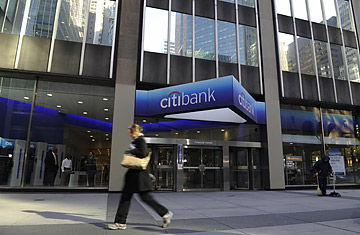
Citibank branch at the US bank Citigroup world headquarters on Park Avenue, in New York.
(3 of 3)
3. Citi Gets Sold
A sale of Citigroup used to be unthinkable. But at $20 billion in market capitalization, Citigroup has become a more digestible acquisition. Still, a number of the financial firms that would be interested are either hurting on their own and could not afford to add Citi's troubled loans to its books, or have just completed another acquisition. So cross Morgan Stanley, J.P. Morgan and Wells Fargo off the list.
Goldman Sachs is one possible suitor. Its market capitalization of $21 billion is now slightly larger than Citigroup's. And at $53 a share, investors don't seem to be too worried about Goldman going under, yet. So Goldman could use its shares to finance an acquisition. What's more, Goldman might like to get its hands on Citi's $780 billion in bank deposits and 200 million customers. Goldman recently converted to a bank holding company and plans to start attracting bank deposits on its own. But opening up branches is costly. Buying Citi, even with its troubled assets, could be cheaper way for Goldman to expand.
Another possible suitor could be US Bancorp. The Minneapolis bank is one of the nation's largest, but it has little presence on the East Coast, where Citi is big player. U.S. Bancorp has a market cap of $40 billion, about double the size of Citigroup. What's more, U.S. Bancorp chief financial officer Andrew Cecere recently told the Wall Street Journal said that the firm was interested in making a large acquisition.
4. Uncle Sam to the Rescue, Again
After the mess that followed Lehman Brothers, regulators have no interest in seeing another big financial player go belly up. And now the government has a vested interested in not letting that happen. In October the government, as part of the TARP program, invested $25 billion in Citigroup. Treasury Secretary Henry Paulson has said he will do everything to protect that and other taxpayer investments. Paulson agreed to invest more money in AIG to keep that insurance company alive. So there is reason to believe he would do it again with Citi.
There are a number of things the government can do to help Citigroup stay afloat. Perhaps the lowest cost solution would be for the government to guarantee some or all of Citi's debts. That would entail no initial outlay of funds. And with many analysts saying that Citi's books are fundamentally sound, this could be the way to go. With a guarantee Citi would not be forced to sell its assets at a discount, if any of the bank's creditors or trading partners want their money back. That would save Citi from having to write down its assets, which is what would wipe out its equity and send it into bankruptcy. Of course, if the bank does fail, the government could be on the hook for hundreds of billions of dollars of debt.
Another option could put more money into the firm from the TARP program. The problem with that plan is Citigroup may need more money than the Treasury could inject into the firm. Paulson only has $60 billion left of the initial $350 in TARP funds that he can spent without having to face a review from Congress. More importantly, the government does not want to end up owning Citigroup. Then taxpayers would be on the hook for all of the bank's debt. So the most the government could invest in Citigroup would be $20 billion, which is the amount equal to what is held by current shareholders. If Citigroup were to issue shares to the government greater than its current value, taxpayers would be left with a more than 50% stake in the company.
Lastly, the government could make some regulatory changes and hope for the best. First of all, get rid of mark-to-market accounting. Some observers say it doesn't make sense for loans that are performing, and the banks have no intention of selling anyway.
Next, the government could suspend trading in the credit default swaps on Citigroup's debt. The price of those contracts, which pay out if Citi goes bankrupt, have been rising recently, and that is spooking the stock investors. Without that constant reminder of the increasing chance of Citi going out of business, some observers say the stock would rise.
"You break the negative feedback loop," says Seacliff's James Ellman.
Citi has already asked the government to restrict short-selling (where investors borrow stock in hopes that the price will fall) in its shares. Executives hope that getting rid of the people rooting for the firm's demise could relieve some pressure on the company's shares. What's more, to close their positions, short sellers would have to buy the shares they borrowed.
Again, the stock would probably rally. But the question is, for how long? And none of these moves address the problem that is really holding down Citi's shares. The bank has bad loans, and no one, probably not even the executives at Citi, know just how bad they are.
